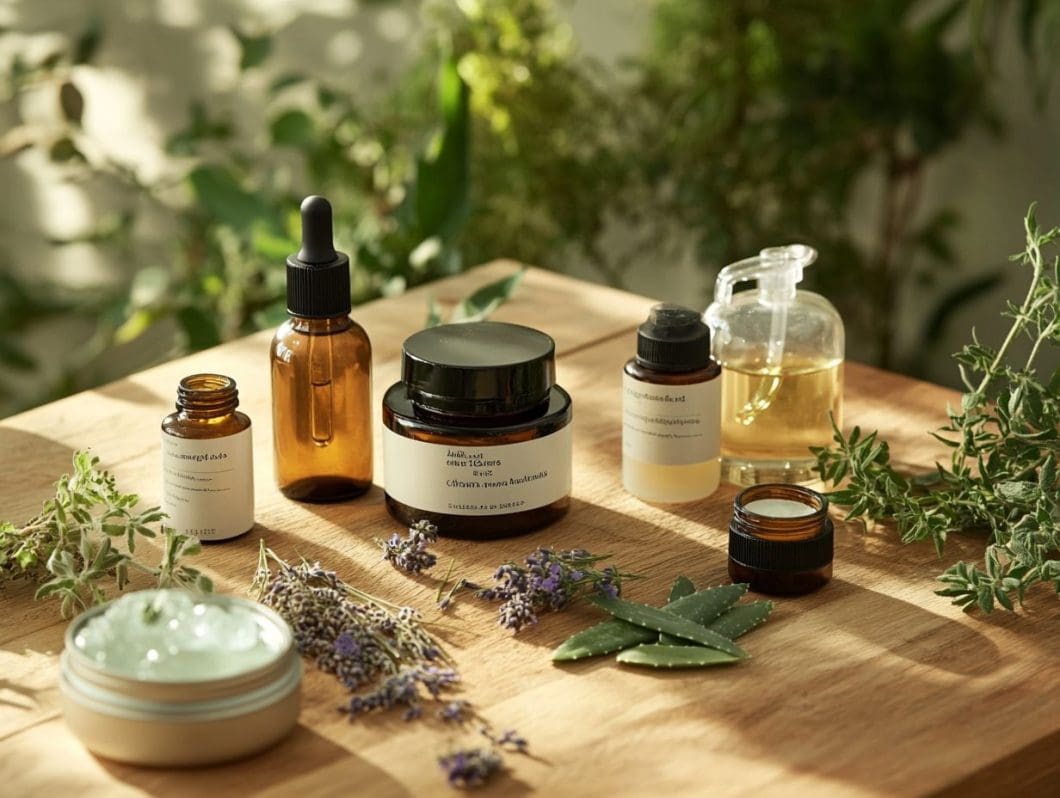In a world increasingly focused on natural solutions, herbal remedies have emerged as powerful allies in tackling common skin issues.
Whether you’re battling acne, dealing with the discomfort of eczema, or seeking relief from psoriasis, this article explores how herbs can offer gentle yet effective treatments.
From nourishing dry skin to soothing sunburn, discover the benefits of using herbs for clearer, healthier skin.
Embrace nature’s gifts and unlock the potential for radiant skin.
Key Takeaways:
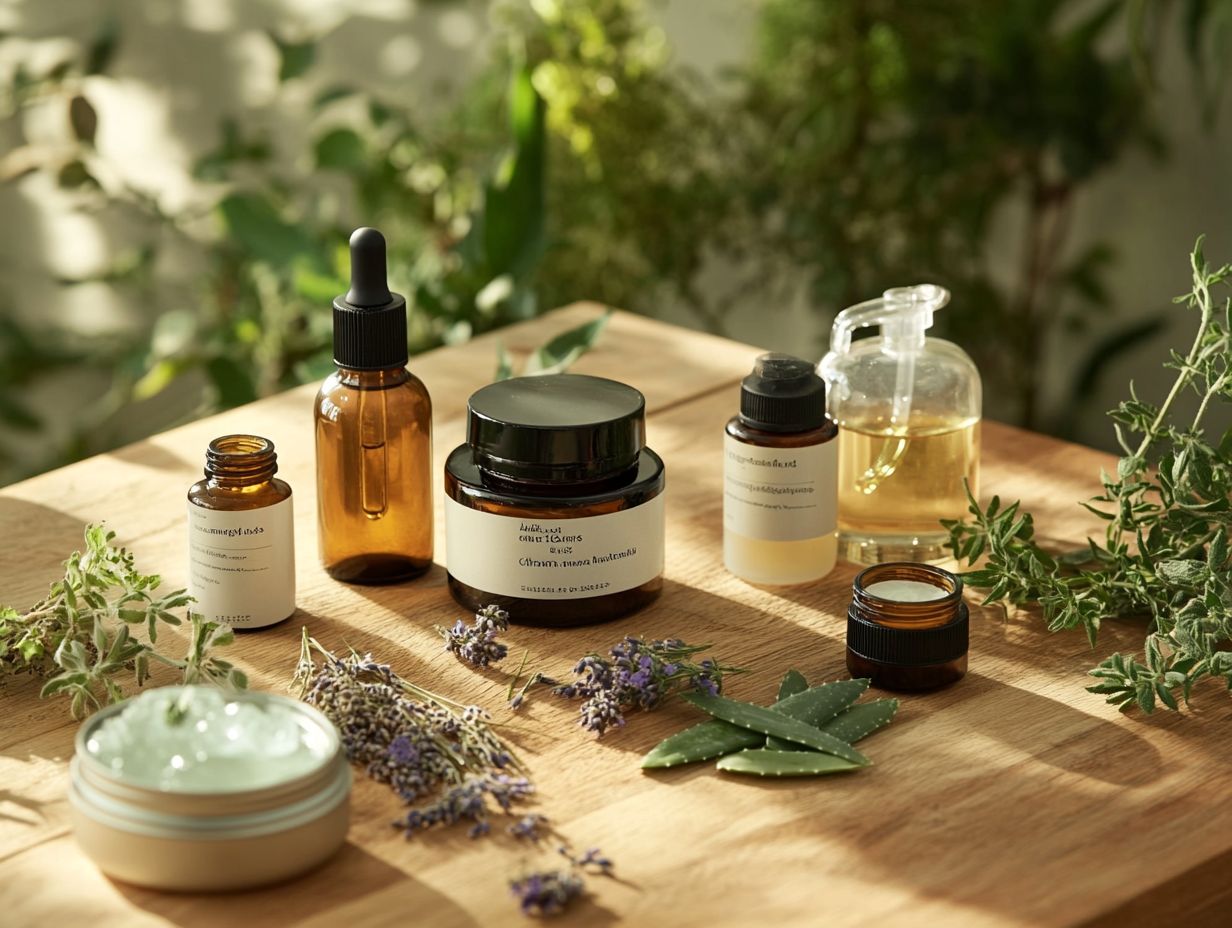
- Incorporating herbal remedies into your skincare routine can provide numerous benefits, including clearer, softer, and healthier skin.
- Some of the most effective herbs for treating acne include tea tree oil, aloe vera, and turmeric, all of which have natural anti-inflammatory and antibacterial properties.
- For those struggling with eczema, soothing herbs like chamomile, calendula, and lavender can help reduce inflammation and irritation without harsh chemicals.
- Certain herbs, such as neem, burdock root, and dandelion, can be beneficial for those dealing with psoriasis by reducing inflammation and promoting healing.
- Dry skin can be relieved and nourished by using herbs like rosehip, jojoba, and shea butter, which provide deep hydration and essential nutrients.
- When dealing with a sunburn, herbs like aloe vera, green tea, and witch hazel can help soothe and heal damaged skin.
Benefits of Using Herbal Remedies
Herbal remedies have been employed for centuries across various cultures, demonstrating considerable benefits in health promotion and the treatment of diverse dermatological conditions. These natural treatments offer not only therapeutic effects but also contribute to skin health through their antimicrobial properties and holistic approaches. Essential oils and herbal medicine play integral roles in contemporary beauty treatments, underscoring the importance of incorporating these methods into skincare and overall wellness practices.
For example, tea tree oil is well-regarded for its efficacy in combating acne due to its potent antibacterial properties, while calendula is esteemed for its ability to promote wound healing and soothe irritated skin. Research indicates that chamomile can significantly reduce inflammation, effectively alleviating conditions such as eczema and dermatitis. Additionally, herbs like lavender and rosemary not only provide calming scents but also support skin rejuvenation and offer antioxidant protection.
Integrating these remedies into daily routines can promote improved skin health, presenting a natural alternative to chemically-laden products that often carry undesirable side effects.
Herbs for Acne
Acne is a prevalent skin condition that affects individuals across various age groups and can profoundly influence self-esteem, thereby necessitating effective treatment options.
Herbal remedies, especially those incorporating essential oils such as tea tree oil and lavender oil, have gained recognition as effective means of managing acne due to their antimicrobial properties and their capacity to enhance skin barrier function.
These natural treatments provide an alternative to conventional approaches, addressing the underlying causes of acne while promoting overall skin health.
Natural Treatments for Clearer Skin
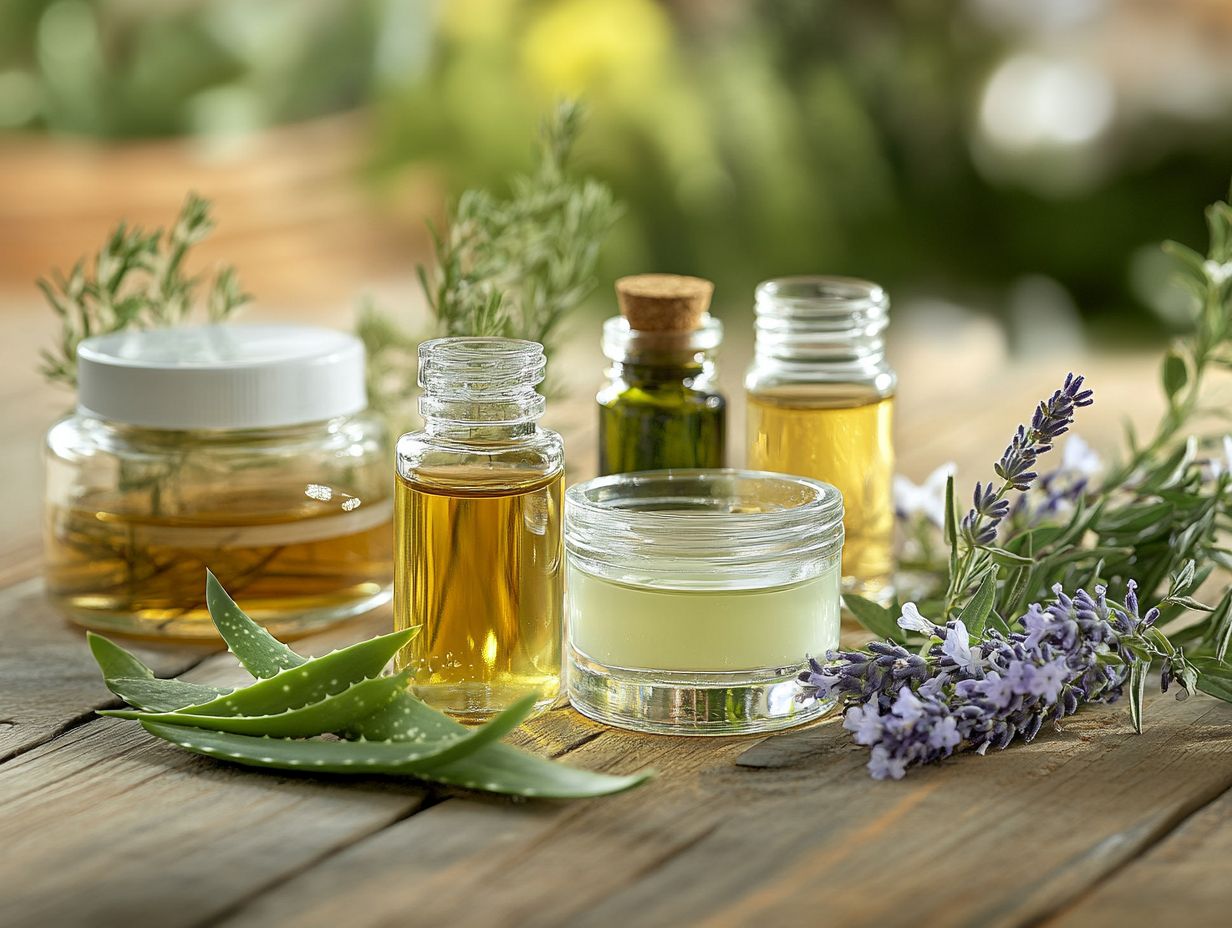
Natural treatments for clearer skin leverage the efficacy of herbs and essential oils to address acne and related skin conditions effectively. By utilizing the anti-inflammatory properties and therapeutic effects of various botanical extracts, these remedies promote skin health and enhance beauty treatments without the adverse effects commonly associated with pharmaceuticals.
Incorporating these natural treatments into a daily skincare regimen can be both straightforward and beneficial. For instance, tea tree oil, renowned for its antibacterial properties, can be diluted with a carrier oil and applied directly to blemishes. Meanwhile, lavender oil may provide soothing benefits and promote relaxation during skincare routines. Herbal infusions, such as chamomile or calendula, can serve as gentle cleansing agents or toners, aiding in the balance of the skin’s natural oils.
With consistent use of these remedies over time, individuals may experience improved skin texture and resilience, ultimately fostering a healthier and more vibrant complexion.
Herbs for Eczema
Eczema is a chronic skin condition characterized by inflammation and irritation, which requires effective treatment options to alleviate symptoms and promote healing.
The use of herbal remedies such as Aloe vera and evening primrose oil has demonstrated promising results in the management of eczema, owing to their soothing properties and ability to support collagen synthesis, thereby enhancing overall skin health.
These natural treatments provide a holistic approach to eczema care, addressing the underlying inflammation while improving the skin barrier function.
Gentle Solutions for Irritated Skin
Gentle solutions for irritated skin encompass the use of herbal remedies known for their calming properties, which can effectively alleviate symptoms associated with eczema. By incorporating these natural treatments, individuals can soothe inflammation and promote healing without the use of harsh chemicals, rendering herbal medicine a preferred choice for those seeking relief from skin irritation.
These remedies not only provide a soothing effect but also harness the power of nature to nourish the skin. For example, chamomile is widely recognized for its anti-inflammatory properties, while calendula is beneficial for healing and skin regeneration. Aloe vera is often praised for its hydrating qualities, making it particularly advantageous for sensitive skin types.
By integrating these herbal options into their daily routines, individuals may experience enhanced comfort alongside their existing eczema treatments, thereby improving overall skin health while minimizing irritation and discomfort.
Herbs for Psoriasis
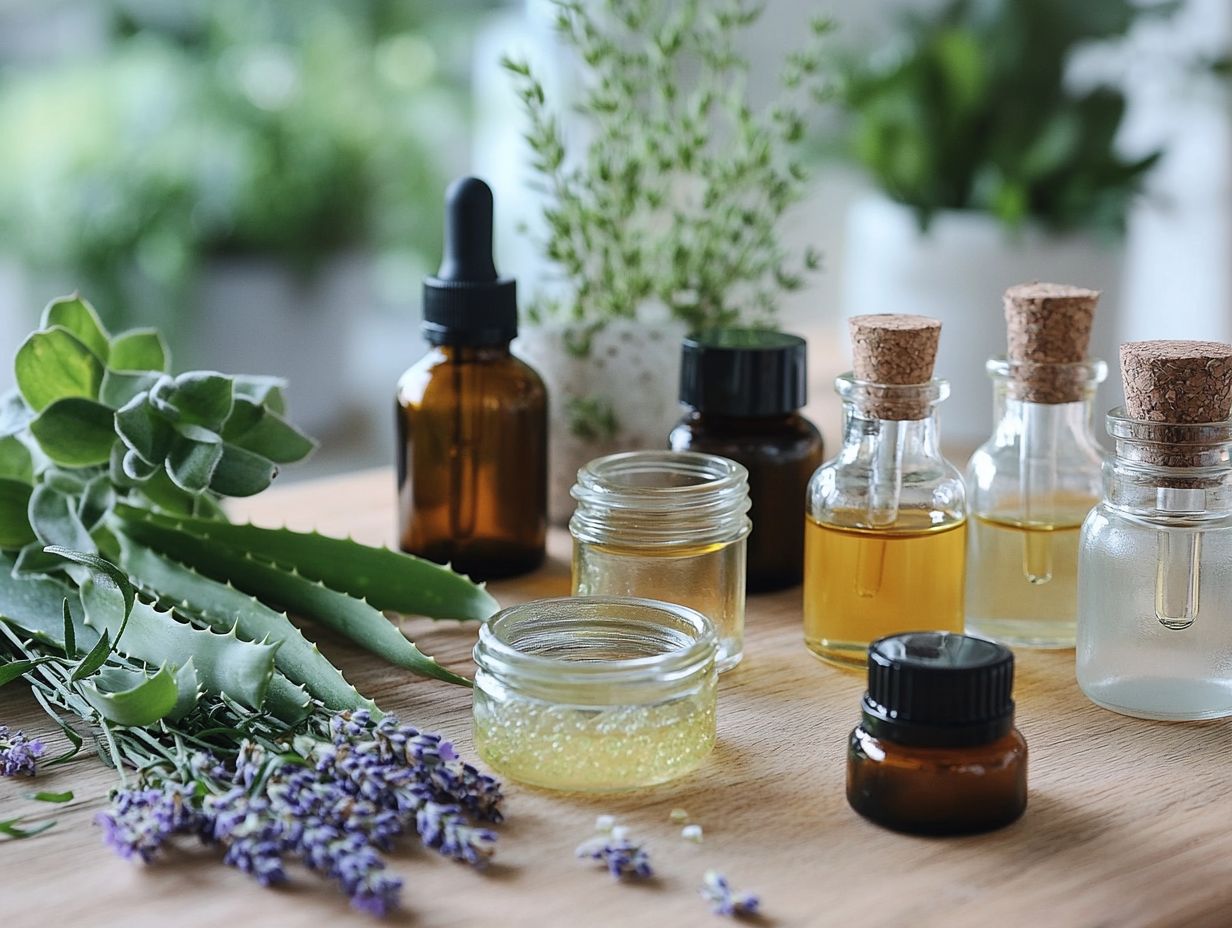
Psoriasis is a chronic autoimmune skin condition characterized by accelerated skin cell production, resulting in thick, scaly patches that may cause itching and discomfort.
The exploration of herbal remedies, such as turmeric and Reishi mushroom, has gained popularity owing to their anti-inflammatory properties and potential to modulate immune responses. These natural alternatives provide hope for individuals seeking non-conventional treatments for psoriasis.
The objective of these remedies is to alleviate inflammation and enhance overall skin health.
Relieving Symptoms and Promoting Healing
Relieving the symptoms of psoriasis and promoting healing is essential for enhancing the quality of life for individuals affected by this condition. Herbal remedies can play a significant role in this process. The utilization of natural remedies with established therapeutic effects can assist in managing inflammation and supporting skin rejuvenation, thereby fostering an environment conducive to healing.
Among these herbal remedies, aloe vera is notable for its soothing properties, effectively reducing redness and irritation. Similarly, tea tree oil possesses antifungal and antibacterial attributes that can help prevent secondary infections often associated with inflamed skin. Turmeric, particularly its active compound curcumin, demonstrates potential in inhibiting inflammatory pathways, thereby further aiding in symptom relief.
Given the diverse range of options available, it is imperative for individuals to explore these treatments in consultation with healthcare professionals, ensuring that the selected methods align with their unique physiological needs and overall skin health objectives.
Herbs for Dry Skin
Dry skin is a prevalent condition that can result in discomfort and an increased vulnerability to various dermatological issues, highlighting the need for effective moisturizing solutions.
Herbal remedies, including essential oils and plant extracts, have demonstrated the ability to enhance skin barrier function and provide deep hydration, making them valuable options for individuals seeking natural treatments for dry skin. These remedies not only hydrate the skin but also promote overall skin health and resilience.
Moisturizing and Nourishing Ingredients
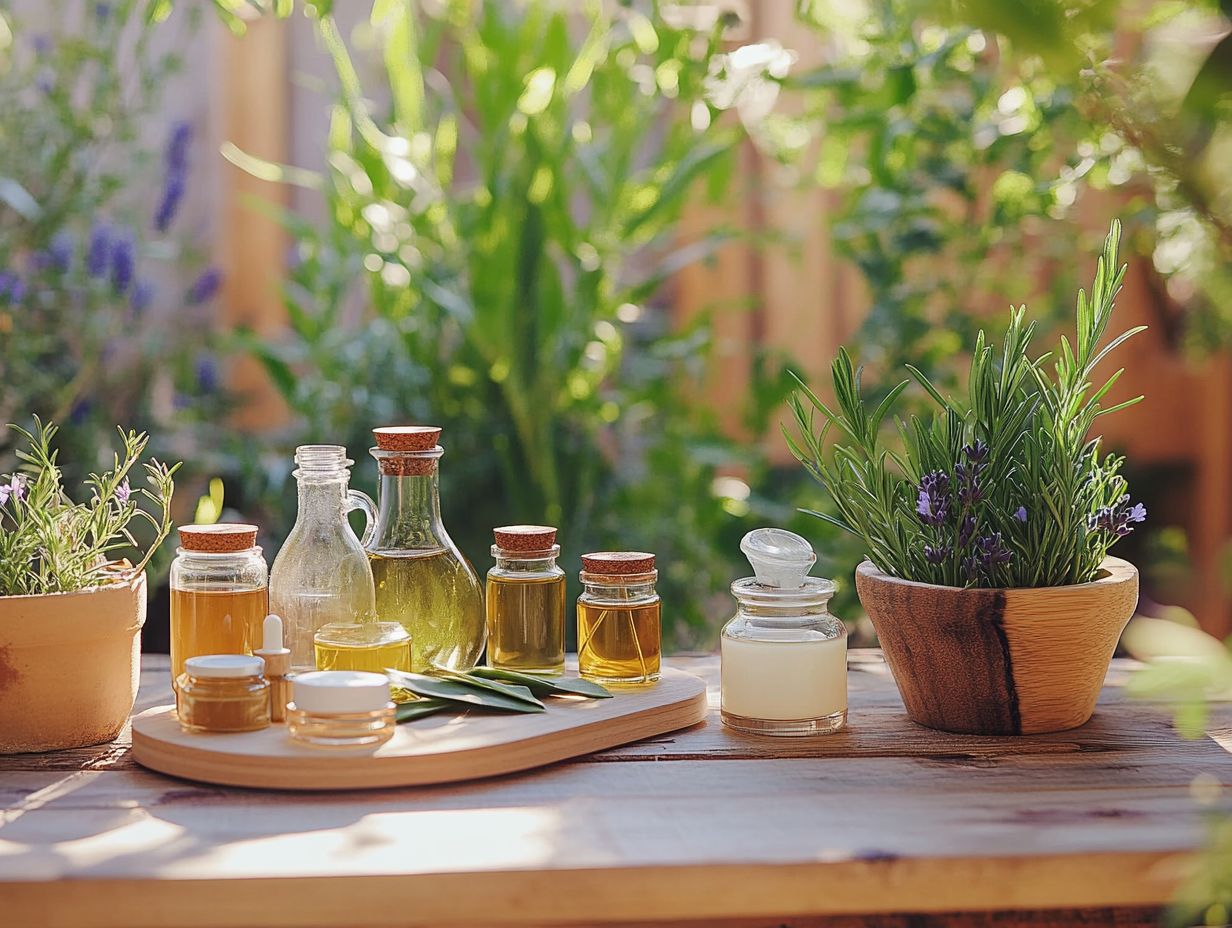
Moisturizing and nourishing ingredients are essential for addressing dry skin and maintaining overall skin health, with herbal extracts and essential oils playing a significant role. These natural remedies not only provide hydration but also supply critical nutrients that support skin vitality and resilience, making them exemplary choices for beauty treatments aimed at achieving soft, supple skin.
Incorporating a combination of these moisturizing herbs and oils can elevate a skincare routine into a revitalizing experience. For instance, aloe vera is renowned for its soothing properties, effectively calming irritated skin while delivering a refreshing boost of moisture. Similarly, chamomile oil is beneficial in reducing redness and inflammation, making it particularly advantageous for sensitive skin types.
Users often report that adding a few drops of lavender or tea tree oil to a daily moisturizer not only enhances hydration levels but also offers protective benefits against environmental stressors. When applied using gentle massage techniques, these oils improve both absorption and circulation, thereby amplifying their efficacy and promoting a nourished complexion.
Herbs for Sunburn
Sunburn is a painful condition that arises from excessive exposure to sunlight, necessitating effective healing and soothing remedies for recovery.
Herbal remedies, such as Aloe vera and Calendula, have been widely acknowledged for their efficacy in alleviating the symptoms of sunburn and promoting skin healing, thereby providing natural relief for damaged skin.
These treatments utilize the beneficial properties of plant extracts to soothe inflammation and restore skin health following sun exposure.
Healing and Soothing Sun-Damaged Skin
Healing and soothing sun-damaged skin necessitates effective remedies that can alleviate pain and restore skin integrity, and herbal remedies present exceptional options. With their natural anti-inflammatory properties, these treatments can facilitate healing and provide significant relief from the discomfort associated with sunburn.
One notable remedy is aloe vera, recognized for its cooling properties and its ability to hydrate the skin rapidly. The gel forms a protective barrier while promoting cell regeneration.
Chamomile, frequently utilized in skincare, contains anti-inflammatory agents that assist in reducing redness and irritation. The application of chamomile tea compresses can further enhance this effect.
Another advantageous herb is calendula, which improves circulation and accelerates tissue repair, making it an effective option for addressing damaged skin.
Incorporating these herbs into a comprehensive skincare regimen not only addresses immediate symptoms but also promotes long-term skin health and resilience against future sun exposure.


